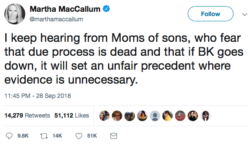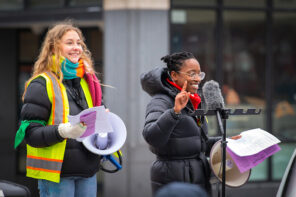It was the tweet that encapsulated the growing “son worry” backlash to Christine Blasey Ford’s sexual assault testimony. In a tweet that rocketed around the right-wing Twittersphere, Fox News host Martha MacCallum wrote last Friday, the day after the charged Senate Judiciary Committee hearing:

The narrative that the greatest danger regarding sexual assault in this country was to the reputations of thousands, nay millions, of innocent men, quickly went viral. In an interview with the Daily Mail TV, Donald Trump, Jr., said, “I’ve got boys, I’ve got girls. When I see what’s going on right now, it’s scary,” referring to his five young children. When asked which of his children he is most worried about, he said, “Right now, I’d say my sons.”
Soon, the Washington Post was reporting in a front page article: “Male fury and fear rises in GOP in defense of Kavanaugh,” as Republican men contemplated the horror of a wave of “false accusers who are biased against them.”
There are at least two problems with this narrative. One is that the fear of false sexual assault allegations seems to be wildly overblown. According to a new poll from the Public Religion Research Institute:
The vast majority of Americans also do not worry about being falsely accused of sexual harassment at work. More than eight in ten (84%) do not worry that they will be falsely accused, while fewer than one in five say they worry somewhat (12%) or a great deal (4%).
And, it should be pointed out, this vast majority of Americans is correct to not worry. False accusations are both rare and easily identifiable, according to experts.
The second problem with the son panic-narrative is that it flies in the face of the long-time insistence from those on the religious and cultural right that the answer to what they see as America’s rampant sexual immorality is to return to a culture of chastity. MacCallum and many others no doubt believe that their sons have been perfect gentlemen wrongfully accused by craven women eager to take them down. But since false accusations are rare and since son-panickers have made little effort to distinguish between those decrying baseless allegations and those looking to excuse “boys will be boys” behaviors, it makes much more sense to focus on the latter.
With that in mind, what about all those Ross Douthat paeans to the lost “structures of suburban bourgeois Christian morality,” which led to “drunken teenage parties in the suburbs and hard-core pornography in Times Square”?
What about the millions and millions of federal dollars spent on largely ineffective “abstinence-only” sex-ed programs designed to teach teens to just say no to sex? What about the “purity” movement’s insistence on front-porch courtships and chaste, chaperoned dating where a couple wouldn’t even exchange so much as a kiss until they were engaged?
If the sons of the right were following their own side’s prescriptions for sexual morality, it seems like they wouldn’t have a whole lot to worry about. It’s unlikely you’re going to be accused of assaulting a young woman on her own front porch with her father presumably sitting inside, shotgun at the ready.
The real hypocrisy, of course, is that these religious-right prescriptions were never supposed to apply to their sons, only to their daughters. That their sons should have free rein to let “boys be boys” or to “sow their wild oats” went hand-in-hand with the idea that chaste girls wouldn’t have to worry about such boys because their own sexual experimentation would be heavily policed.
So the so-called “son panic” is really anger that their sons are no longer free to do whatever they want and get away with it—as long as they “do it” to the right (as in: wrong) girls.




